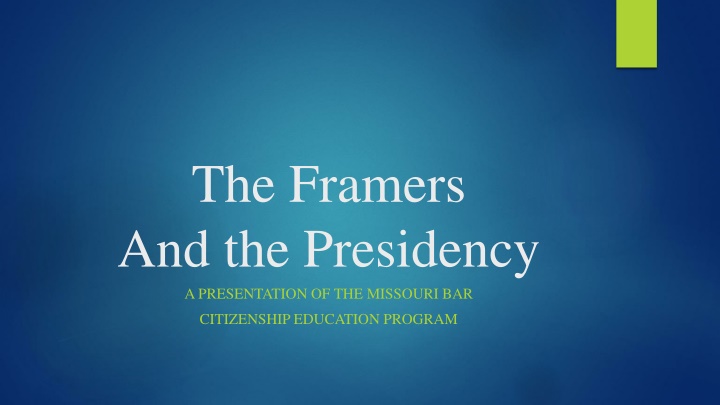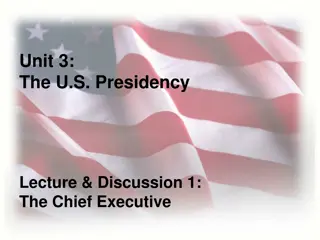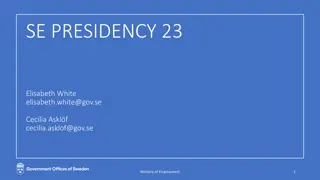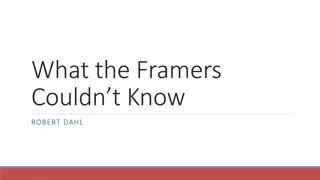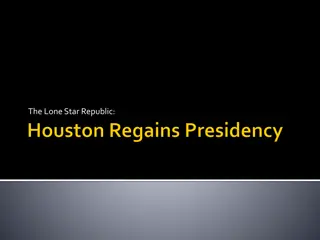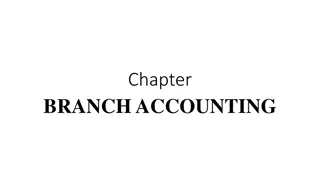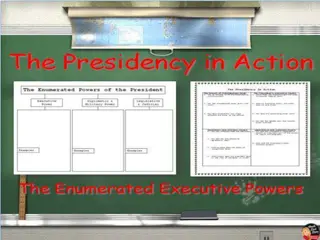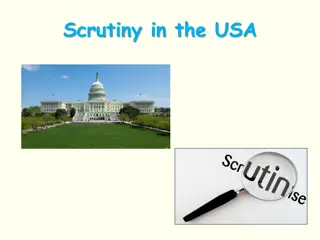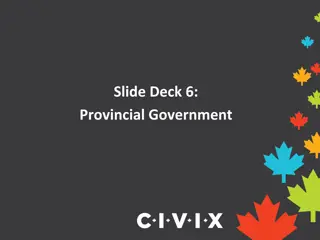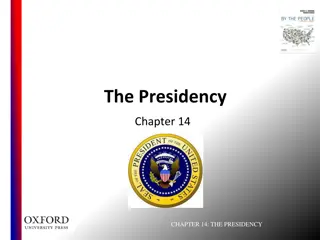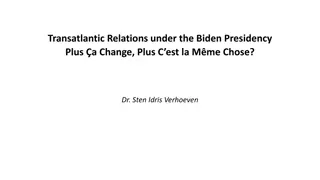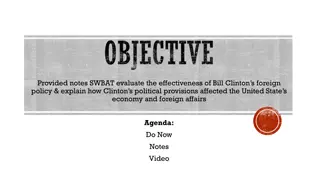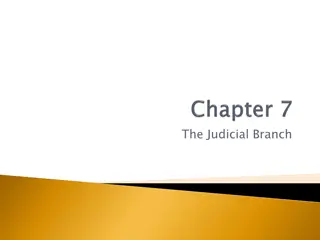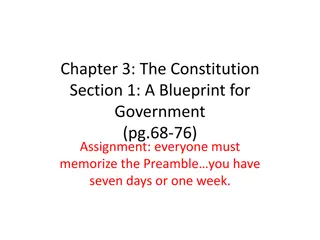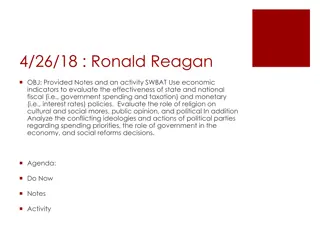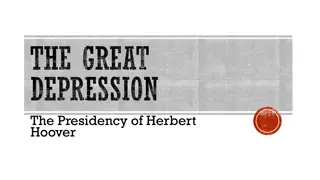The Framers' Vision of the Presidency: A Coequal Branch of Government
The Framers of the Constitution designed the presidency to be a coequal branch of government rather than dominant. Drawing lessons from past experiences, they established a system of checks and balances to prevent the concentration of power in one individual. The presidency was seen as necessary but within the framework of limited government and separation of powers, ensuring accountability and responsiveness to the people.
Download Presentation

Please find below an Image/Link to download the presentation.
The content on the website is provided AS IS for your information and personal use only. It may not be sold, licensed, or shared on other websites without obtaining consent from the author.If you encounter any issues during the download, it is possible that the publisher has removed the file from their server.
You are allowed to download the files provided on this website for personal or commercial use, subject to the condition that they are used lawfully. All files are the property of their respective owners.
The content on the website is provided AS IS for your information and personal use only. It may not be sold, licensed, or shared on other websites without obtaining consent from the author.
E N D
Presentation Transcript
The Framers And the Presidency A PRESENTATION OF THE MISSOURI BAR CITIZENSHIP EDUCATION PROGRAM
The presidency was not designed by the Framers as dominant, but rather a coequal branch of government The Framers recognized the presidency as necessary, but wanted it to exist firmly within the system of checks and balances
To understand the presidency as intended by the Framers of the Constitution, we must begin with the lessons of two very distinct events
The experience of life under King George III made the Framers skeptical of giving any one person too much power
However, the failure of the Articles of Confederation was still fresh in their minds One of the reasons the Articles failed was the lack of an effective chief executive and made the Framers realize a president would be necessary to succeed
Thus, the Framers were willing to create a President of the United States, but one who would exist within a philosophy of limited government, a separation of powers and the system of checks and balances
The Framers saw a number of advantages of an energetic president, empowered by the Constitution
Advantages of a President A president would be able to act decisively when decisive action was required It would be easier to hold a single individual in the presidency accountable and responsible for his actions A president would be responsive to the people, but not subject to every sudden breeze of passion or transient impulse, as would be the House of Representatives
Advantages of a President As head of the executive branch, the president would be responsible for the administration of government and the execution of laws The president would act as a gate-keeper, rejecting laws that do not meet constitutional standards and promote the general welfare Since the president s salary was fixed, he would not be beholden to a Congress that might try to raise or lower his pay to influence him
As Alexander Hamilton argued in Federalist 69, the president s position was significantly less powerful than a king
Comparing Kings and Presidents The King The President The people would play a role (albeit an indirect one) in choosing who the president would be The people had no say in determining who the King would be
Comparing Kings and Presidents The King The President Under the Constitution, the president could be brought up on charges and removed from office The King s rule was sacred and inviolable: chosen by God and could only be removed by God
Comparing Kings and Presidents The King The President While the president has the power to veto, or reject, a law passed by Congress, Congress could override that veto The King was able to reject completely an act passed by Parliament
The powers and duties of the president identified in Article II of the Constitution show that while the president would play a substantial role in this new system, the president was not to be the dominant power
The Power as Commander in Chief The President is given significant power as Commander in Chief of the armed forces of the United States However, Congress is able to limit this power with its authority to declare war, raising and regulating armies and fleets and by controlling spending on defense
The Power to Pardon The President is given the absolute power to pardon individuals for offenses committed against the United States (federal crimes) However, that pardon power does not extend to impeachment. Since Congress is the branch responsible for impeachment, this gives Congress the final say on which public officials will be removed from office
The Treaty Power The President is given the power to negotiate treaties with other nations, obligating the United States to agreements the president considers important Those treaties do not become binding until the Senate provides ratification of a treaty
The Appointment Power The President is given the power to appoint some of the most important officials in government: ambassadors, judges and officers of the United States Those appointments require Senate confirmation and the Senate may prevent the president from putting the preferred individuals into office
The State of the Union The president is required to provide Congress with information on the state of the union This invites Congress to play a role in the making of policy and the addressing of the nation s problems and issues
Recommendations to Congress The president is able to recommend to Congress ideas for laws that are necessary and expedient However, it will be Congress that determines whether these ideas actually become the law of the land
Recommendations to Congress The president is able to recommend to Congress ideas for laws that are necessary and expedient However, it will be Congress that determines whether these ideas actually become the law of the land
Faithful Execution of the Laws The president is responsible for taking care that the laws are faithfully executed Congress will be writing the laws and this presidential duty requires the president to carry out the will of Congress
The Framers Created Impeachment, The Ultimate Check on the President The first step of the impeachment process is the House of Representatives voting to bring charges against the president for treason, bribery and other high crimes and misdemeanors. At this point, the president has been impeached The second step of the process is a trial and the Senate voting on whether the president is guilty of the offenses charged by the House. A two-thirds vote is required to remove the president.
The Framers Created a Supreme Court and Provided it With a Check on the President By granting the Supreme Court the judicial power, the Framers made it very likely that the Court would be hearing cases involving the president. It would be entirely likely that the Court could rule against the president and limit the actions available to the president.
Clearly, the Framers spent much time thinking about the presidency and making choices about how the president would fit into the constitutional system At this point, we want you to evaluate the decisions made by the Framers. What were the choices the Framers made about the presidency that you regard as the wisest? Did the Framers make any choices about the presidency that you regard as a mistake?
